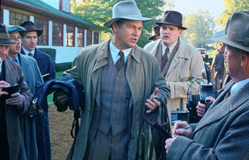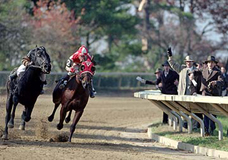|
Newest Reviews:
New Movies -
The Tunnel
V/H/S
The Tall Man
Mama Africa
Detention
Brake
Ted
Tomboy
Brownian Movement
Last Ride
[Rec]³: Genesis
Hara-Kiri: Death of a Samurai
Indie Game: The Movie
Abraham Lincoln: Vampire Hunter
Old Movies -
Touki Bouki: The Journey of the Hyena
Drums Along the Mohawk
The Chase
The Heiress
Show
People
The Strange Affair of Uncle Harry
Pitfall
Driftwood
Miracle Mile
The Great Flamarion
Dark Habits
Archives -
Recap: 2000,
2001, 2002,
2003, 2004
, 2005, 2006,
2007 , 2008
, 2009 ,
2010 , 2011 ,
2012
All reviews alphabetically
All reviews by star rating
All reviews by release year
Masterpieces
Screening Log
Links
FAQ
E-mail me
HOME
| |
Seabiscuit (Gary Ross, 2003)
 During a photo montage at the opening of
Gary Ross’ Seabiscuit the narrator
describes the coming of the assembly line as “the beginning and the end of
imagination at the same time.” This is the same sort of vague and
counterproductive romanticism that powered Ross’ technically admirable,
consistently amusing, but ultimately hokey, Pleasantville.
In that film, which had its entire premise built upon the supposition that the
audience did know what was in store for the inhabitants of its imaginary sitcom
world, Ross ended with the whimsical lines “What happens next?” / “I
don’t know!” It seems Ross wants to give his audiences a sense of wonder in
his films, so he tends to reduce his portrayal of history as something more
uncomplicated and magical than reality. As he’s trying to force the audience
into a position where they will feel reverent awe, he’s smugly exerting his
faux superiority over history by simplifying it, and duping them by using
documentary techniques. Obviously many respond to every Norman Rockwell-inspired
composition the director dishes out here, but to me it feels like a skeptic’s
attempt at sincerity, since every attempt to convey true nostalgia results in
the cornball, as if only things that are good and honest are worth remembering.
In Seabiscuit he shows endless shots of characters wistfully
remembering their pasts and savoring the present (“That’s the poetry right
there, Agnes,” says one man as he’s watching his son ride a horse), just in
case we somehow don’t realize that we’re supposed to be seeing the horse’s
story as part of our collective conscience. During a photo montage at the opening of
Gary Ross’ Seabiscuit the narrator
describes the coming of the assembly line as “the beginning and the end of
imagination at the same time.” This is the same sort of vague and
counterproductive romanticism that powered Ross’ technically admirable,
consistently amusing, but ultimately hokey, Pleasantville.
In that film, which had its entire premise built upon the supposition that the
audience did know what was in store for the inhabitants of its imaginary sitcom
world, Ross ended with the whimsical lines “What happens next?” / “I
don’t know!” It seems Ross wants to give his audiences a sense of wonder in
his films, so he tends to reduce his portrayal of history as something more
uncomplicated and magical than reality. As he’s trying to force the audience
into a position where they will feel reverent awe, he’s smugly exerting his
faux superiority over history by simplifying it, and duping them by using
documentary techniques. Obviously many respond to every Norman Rockwell-inspired
composition the director dishes out here, but to me it feels like a skeptic’s
attempt at sincerity, since every attempt to convey true nostalgia results in
the cornball, as if only things that are good and honest are worth remembering.
In Seabiscuit he shows endless shots of characters wistfully
remembering their pasts and savoring the present (“That’s the poetry right
there, Agnes,” says one man as he’s watching his son ride a horse), just in
case we somehow don’t realize that we’re supposed to be seeing the horse’s
story as part of our collective conscience.
 As handsomely mounted as it is (was the
Depression-era that handsome?), Seabiscuit
is almost unbearable for its first forty-five minutes. Before Ross trots out the
titular horse and the genuinely interesting race sequences begin to fill the run
time, he spends most of his time establishing the trio of men that serve as the
story’s protagonists and fawning over every boyhood antique in sight. A
millionaire, seemingly unaffected by the depression (though there’s a lame
attempt to relate the car crash with the stock market crash) provides the
primary emotional arc in the film. There’s something almost disingenuous in
telling the story of the nation’s recovery from the depression through him,
but there’s also something a bit off about imbuing this sort of reverence to
the memory of a sporting event. Ross attempts to turn the Nike commercial into
an art form, and that attempt peaks when Moby inexplicably appears on the
soundtrack. If a film was made at this pitch about the Superbowl, it would be
laughable. What is it about setting a film in the past that makes filmmakers
think they have carte blanche to be lazy sentimentalists? Occasionally, such as
when William H. Macy is on screen, or during most of the second act, Seabiscuit overcomes such concerns, but basically there’s no
escaping the fact while watching it that we’re essentially watching the story
of an icon founded out of PR hype. As handsomely mounted as it is (was the
Depression-era that handsome?), Seabiscuit
is almost unbearable for its first forty-five minutes. Before Ross trots out the
titular horse and the genuinely interesting race sequences begin to fill the run
time, he spends most of his time establishing the trio of men that serve as the
story’s protagonists and fawning over every boyhood antique in sight. A
millionaire, seemingly unaffected by the depression (though there’s a lame
attempt to relate the car crash with the stock market crash) provides the
primary emotional arc in the film. There’s something almost disingenuous in
telling the story of the nation’s recovery from the depression through him,
but there’s also something a bit off about imbuing this sort of reverence to
the memory of a sporting event. Ross attempts to turn the Nike commercial into
an art form, and that attempt peaks when Moby inexplicably appears on the
soundtrack. If a film was made at this pitch about the Superbowl, it would be
laughable. What is it about setting a film in the past that makes filmmakers
think they have carte blanche to be lazy sentimentalists? Occasionally, such as
when William H. Macy is on screen, or during most of the second act, Seabiscuit overcomes such concerns, but basically there’s no
escaping the fact while watching it that we’re essentially watching the story
of an icon founded out of PR hype.
43
08-22-03
Jeremy Heilman
|